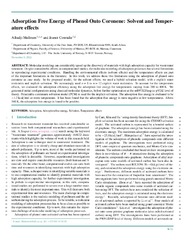Adsorption free energy of phenol onto coronene: Solvent and temperature effects
Permanent link
https://hdl.handle.net/10037/33248View/
Accepted manuscript version (PDF)
Date
2022-11-11Type
Journal articleTidsskriftartikkel
Peer reviewed
Abstract
Molecular modeling can considerably speed up the discovery of materials with high adsorption capacity for wastewater treatment. Despite considerable efforts in computational studies, the molecular modeling of adsorption processes has several limitations in reproducing experimental conditions. Handling the environmental effects (solvent effects) and the temperature effects are part of the important limitations in the literature. In this work, we address these two limitations using the adsorption of phenol onto coronene as case study. In the proposed model, for the solvent effects, we used a hybrid solvation model, with
explicit water molecules and implicit solvation. We increasingly used
to
explicit water molecules. To account for the temperature effects, we evaluated the adsorption efficiency using the adsorption free energy for temperatures varying from 200 to 400 K. We generated initial configurations using classical molecular dynamics, before further optimisation at the
B97XD/aug-cc-pVDZ level of theory. Polarisable continuum solvation model (PCM) is used for the implicit solvation. The adsorption free energy is evaluated to be -1.3 kcal/mol at room temperature. It has been found that the adsorption free energy is more negative at low temperatures. Above 360 K, the adsorption free energy is found to be positive.
Publisher
ElsevierCitation
Malloum, Conradie. Adsorption free energy of phenol onto coronene: Solvent and temperature effects. Journal of Molecular Graphics and Modelling. 2023;118Metadata
Show full item recordCollections
Copyright 2023 The Author(s)


 English
English norsk
norsk